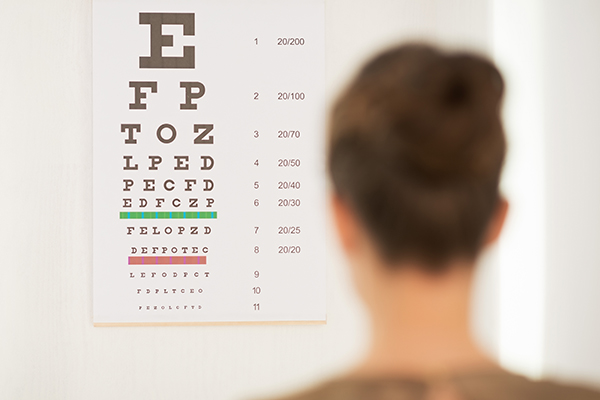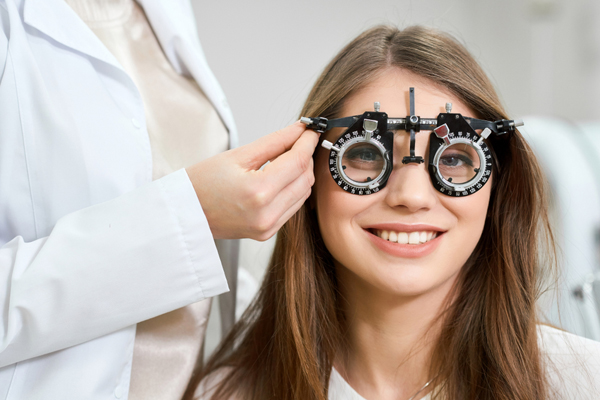What Happens During an Optometry Office Vision Test

Do you need a vision test? Read on to learn more about what happens during a vision test by an optometrist. An optometry office vision test is recommended for patients who are having trouble with their vision, whether their concerns are related to nearsightedness (myopia), farsightedness (hyperopia), eye pressure complications, eye health issues, or another eye-related concern. This review discusses what takes place during an office vision test with an optometrist.
What happens during a vision test?
A vision test, also simply called an eye exam, is a visit with an eye doctor (usually an optometrist) in which the patient’s vision and eye health are tested. This is most commonly performed to assess the patient’s need for eyewear or an alternative procedure or treatment plan to improve vision.
The experience for every patient is unique, but there are certain steps in a vision test that patients can expect to undergo. Notably, patients can expect to discuss their symptoms with the optometrist and go through several tests to determine their visual acuity, eye pressure, and overall eye health.
The patient meets with the optometrist
The first step in the vision test process is usually to meet with the optometrist and discuss with them your vision concerns. Understanding the concerns that the patient is having can help guide the diagnostic process and allow for a more appropriate and effective treatment solution.
A test of your visual acuity
The next step in the vision test process is usually a visual acuity test; this is simply a way to measure the patient’s vision and determine if they need glasses or contact lenses. Most notably, a visual acuity test involves viewing a chart from 14 to 20 feet away and reading letters that are on the chart. The patient reads letters with both eyes and then covers each eye and repeats the process.
The eye doctor can compare the patient’s results to the average patient and determine if their vision is normal or in need of improvement. The most common conditions that are diagnosed from a visual acuity test (along with other diagnostic tests) include myopia (nearsighted) and hyperopia (farsighted).
A test to determine your eye pressure
An optometry office vision test usually also includes a measurement of the patient’s eye pressure. For this test, the eye doctor may give the patient a numbing drop before they examine their eyes. An eye pressure test, among other purposes, can help eye doctors determine the patient’s risk for glaucoma, a condition in which the optic nerves are damaged over time, resulting in blindness or blind spots.
An evaluation of your overall eye health
The eye doctor may also want to examine the patient’s eye health in greater detail. There are multiple tests that the eye doctor may perform based upon the patient’s risk factors. Before any tests are performed to check the patient’s eye health, the eye doctor may recommend the use of dilating drops to help improve the accuracy of the tests.
A vision recommendation and treatment plan
At the end of the eye vision test, the eye doctor should be able to explain to the patient the status of their eye health and make a diagnosis if there are any eye conditions or vision impairments that need to be addressed. Also, after the optometry office vision test, the optometrist can help the patient put together a treatment plan.
For example, if the patient has myopia, then the optometrist may recommend prescription eyeglasses or contact lenses to improve the patient’s vision; there are other treatment options that may be available to improve vision as well, such as laser eye surgery or ortho-k treatment. The optometrist may also recommend tips for improving eye health long-term, such as limiting the use of digital devices to avoid eye strain and practicing good eye hygiene.
After the optometry office vision test
A vision test is generally non-invasive and does not take more than an hour to complete in most cases (although wait times may vary). If necessary, the optometrist can schedule a follow-up visit for additional testing or for the patient to pick up their prescription eyewear or start the treatment process for any eye conditions the patient has.
Get in touch with our office to schedule your vision test
If you are having any difficulties with your vision and would like to schedule a vision test, then reach out to our office via phone or message today.
Get more information here: https://brighteyesmv.com or call Bright Eyes Optometry at (914) 668-1429
Check out what others are saying about our services on Yelp: Optometry in Mt Vernon, NY.
Recent Posts
Emergency eye care is needed if you find yourself dealing with a problem with your eye that causes pain or affects your vision. Failing to treat eye injuries as soon as they are detected can lead to permanent consequences, like reduced vision or blindness. Common eye injuries that require emergency eye care include: Exposure to…
Looking for more information on eye protection? An ophthalmologist knows everything there is to know about protecting the eyes. While there are a few different types of eye care professionals, ophthalmologists are eye care professionals who have undergone additional years of education and training so they can offer their patients both medical and surgical eye…
Controlling myopia at an early age can slow down its progression. This can help prevent yearly upgrades for stronger glasses. Your optometrist can help by offering various treatments. If you want to find out how your optometrist can help control myopia, here are the details.Optometrists use atropine eye drops to achieve short-term myopia control results.…
Another word for an itchy eye is ocular pruritis. It is a common health situation in many people. Itchiness in your eyes is more than enough reason to see an optometrist. Receiving prompt treatment is important in receiving prompt relief. If you want to know what causes an itchy eye and the treatments for it,…



